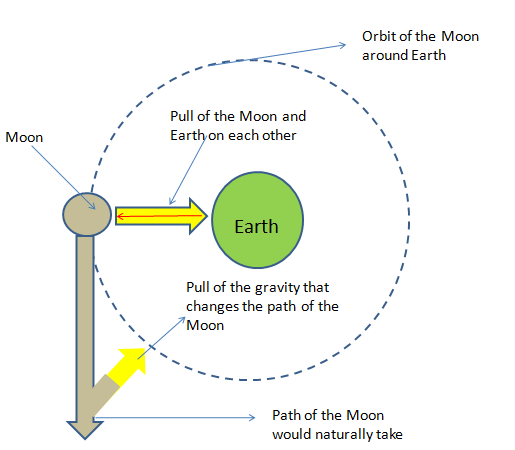
What is the first law of gravity?
Answer
469.2k+ views
Hint: In mechanics, gravity is the universal force of attraction acting between all matter, also known as gravitation. It is the weakest known force in nature. Hence it has no bearing on the intrinsic properties of matter. All bodies on Earth have a weight or downward force of gravity. That is proportional to their mass and exerted by the Earth's mass. The acceleration that gravity imparts to freely falling objects is used to quantify gravity. The acceleration of gravity at the Earth's surface is roughly \[9.8\] meters (\[32\]feet) per second. As a result, an object's speed rises by around \[9.8\] meters per second for every second it is in free fall.
Complete step by step answer:
The first law of gravity:
It's also known as Newton’s law of gravitation.
Definition:
“Every object in the universe attacks every other object with a force directed along the line of centers for the \[2\] objects that is proportional to the product of their masses and inversely proportional to the square of the separation between the \[2\] objects”.
${F_g} = G\dfrac{{{m_1}{m_2}}}{{{r^2}}}$
${F_g}$- Gravitational force.
$G$- universal gravitational constant.
${m_1}\& {m_2}$- The masses of two objects.
$r$- The separation between the objects.
The universal gravitational constant is denoted by $G$ . It's called a "universal constant" because it's assumed to be the same everywhere and at all times, and hence universally characterizes the gravitational force's inherent strength. The numerical value of G is incredibly tiny, which is why gravity is the weakest force in nature.
In SI units, the value of $G$ is \[6.67{\text{ }} \times {\text{ }}{10^{ - 11}}\] Newtons \[k{g^{ - 2}}\;{m^2}\].
However, Newton's universal gravitational rule spreads gravity beyond the globe. The universality of gravity is the subject of Newton's law of universal gravitation. Newton's induction into the Gravity Hall of Fame is based on his finding that gravitation is universal rather than his discovery of gravity. Gravitational attraction is a force that attracts all objects. Gravity is a ubiquitous phenomenon. This gravitational attraction is proportional to the square of the distance between their centers and is directly proportional to the masses of both objects.

Note:
Coulomb's law of electrical forces, which is used to quantify the amount of the electrical force-generating between two charged things. It is similar to Newton's law of gravitation. Both are inverse-square laws, meaning that force is proportional to the square of the distance between the bodies.
Complete step by step answer:
The first law of gravity:
It's also known as Newton’s law of gravitation.
Definition:
“Every object in the universe attacks every other object with a force directed along the line of centers for the \[2\] objects that is proportional to the product of their masses and inversely proportional to the square of the separation between the \[2\] objects”.
${F_g} = G\dfrac{{{m_1}{m_2}}}{{{r^2}}}$
${F_g}$- Gravitational force.
$G$- universal gravitational constant.
${m_1}\& {m_2}$- The masses of two objects.
$r$- The separation between the objects.
The universal gravitational constant is denoted by $G$ . It's called a "universal constant" because it's assumed to be the same everywhere and at all times, and hence universally characterizes the gravitational force's inherent strength. The numerical value of G is incredibly tiny, which is why gravity is the weakest force in nature.
In SI units, the value of $G$ is \[6.67{\text{ }} \times {\text{ }}{10^{ - 11}}\] Newtons \[k{g^{ - 2}}\;{m^2}\].
However, Newton's universal gravitational rule spreads gravity beyond the globe. The universality of gravity is the subject of Newton's law of universal gravitation. Newton's induction into the Gravity Hall of Fame is based on his finding that gravitation is universal rather than his discovery of gravity. Gravitational attraction is a force that attracts all objects. Gravity is a ubiquitous phenomenon. This gravitational attraction is proportional to the square of the distance between their centers and is directly proportional to the masses of both objects.

Note:
Coulomb's law of electrical forces, which is used to quantify the amount of the electrical force-generating between two charged things. It is similar to Newton's law of gravitation. Both are inverse-square laws, meaning that force is proportional to the square of the distance between the bodies.
Recently Updated Pages
Master Class 11 Computer Science: Engaging Questions & Answers for Success

Master Class 11 Business Studies: Engaging Questions & Answers for Success

Master Class 11 Economics: Engaging Questions & Answers for Success

Master Class 11 English: Engaging Questions & Answers for Success

Master Class 11 Maths: Engaging Questions & Answers for Success

Master Class 11 Biology: Engaging Questions & Answers for Success

Trending doubts
One Metric ton is equal to kg A 10000 B 1000 C 100 class 11 physics CBSE

There are 720 permutations of the digits 1 2 3 4 5 class 11 maths CBSE

Discuss the various forms of bacteria class 11 biology CBSE

Draw a diagram of a plant cell and label at least eight class 11 biology CBSE

State the laws of reflection of light

10 examples of friction in our daily life




